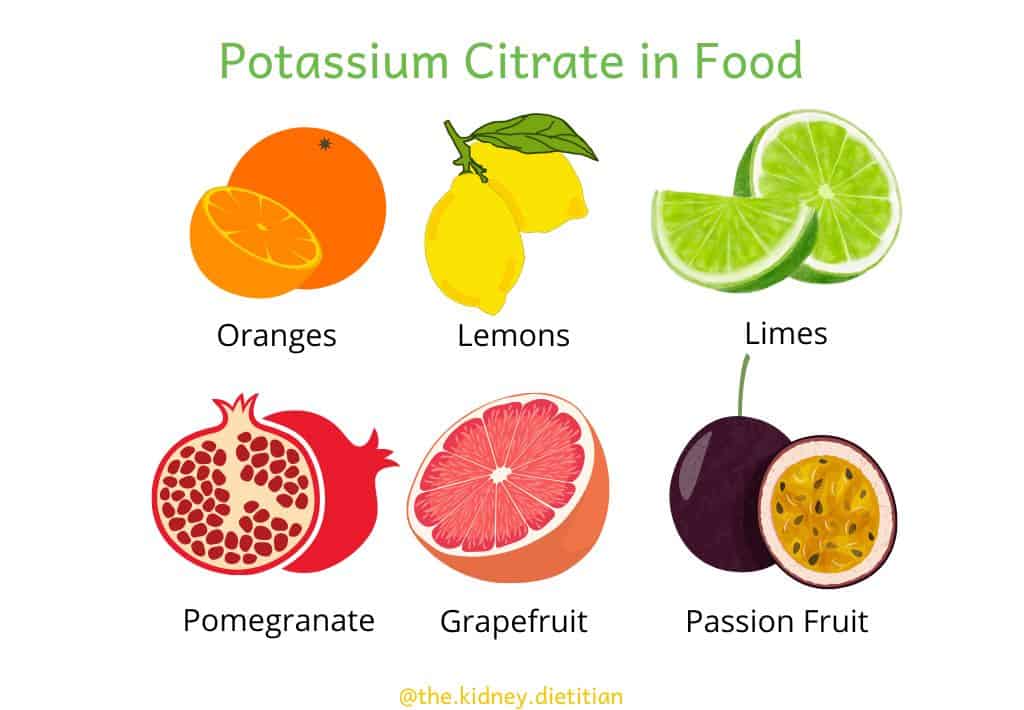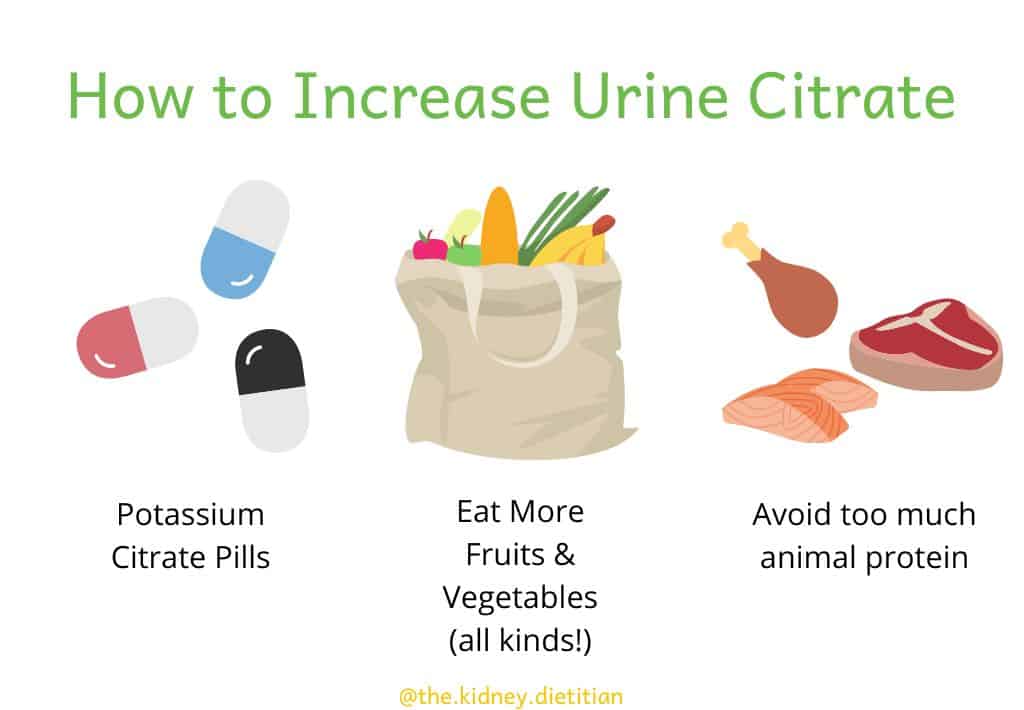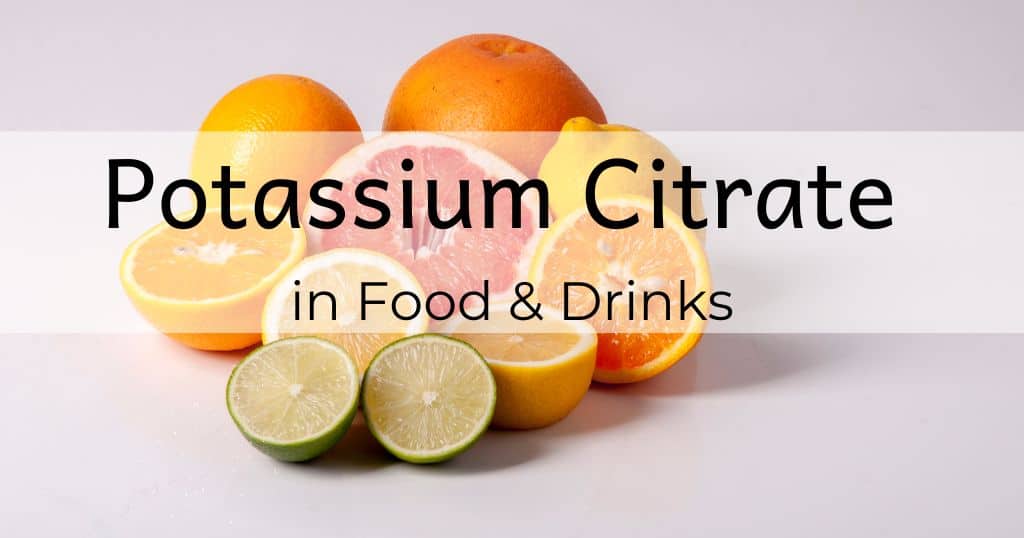Potassium citrate is a hot topic in kidney stone nutrition. It is clear that both potassium and citrate have health benefits for some type of kidney stones. Potassium citrate is a very common medication prescribed for kidney stone prevention. But, can you get potassium citrate in food and drinks?
This article covers everything you need to know!
Table of Contents
What Is Potassium Citrate?
Firstly, what is potassium citrate anyway? Quite simply, potassium citrate is a molecule made of potassium and citrate.
Potassium citrate is found naturally in food, and is also available in supplement form. It is also a common food additive.
Potassium Citrate in Food & Drinks
Natural Potassium Citrate in Food
Potassium citrate occurs naturally in many foods. Potassium doesn’t just hang out by itself. It is usually connected to something else. Citrate is one molecule that potassium likes to bond with.
Potassium occurs naturally in many different forms. Potassium citrate is just one of these. It can also be found as potassium carbonate, sulfate or phosphate. There isn’t necessarily one form of potassium that is better than another.
In a food, there is likely one form of potassium that dominates. In fruits with higher amounts of citrate, more of that potassium will be in the form of potassium citrate. However, potassium is in many different forms, even in the same food.
Here are some examples of foods that have potassium mostly in the form of potassium citrate:
- Oranges
- Lemons
- Limes
- Pomegranates
- Grapefruit
- Tangerine
- Passion fruit

How Much Potassium Citrate is in Food?
Because potassium occurs in so many forms, it is nearly impossible to know how much of that potassium is in the form of potassium citrate.
Instead, I recommend focusing on total potassium intake for health. For most people, it is more important to get potassium from a variety of fruits, vegetables and other plant foods, rather than focus on food sources especially high in potassium citrate.
The National Nutrient Database from the USDA is a wonderful (free!) resource to figure out how much potassium is in food.
A daily potassium goal of 2,600 – 3,400mg is recommended for healthy adults. (1) There is not a different recommendation for people with kidney stones.
| Adequate Intake of Potassium (mg/day) | |
|---|---|
| Males | |
| 14-18 years | 3,000mg |
| 18+ years | 3,400mg |
| Females | |
| 14-18 years | 2,300mg |
| 18+ years | 2,600mg |
| Data from the National Institutes of Health (NIH) | |
| Examples of Higher Potassium Foods | |
|---|---|
| Amount of Potassium | |
| Avocado (1/2 fruit) | 345mg |
| Banana (1 medium) | 358mg |
| Black Beans (1/2 cup canned) | 370mg |
| 2% Milk | 342mg |
| Orange (1 medium) | 255mg |
| Potato (1 medium w/ skin) | 952mg |
| Spinach (1/2 cup cooked) | 420mg |
| Tomato (1 cup cherry tomatoes) | 353mg |
Artificial Potassium Citrate in Food & Drinks
Potassium citrate is also added to food products.
The most common reason potassium citrate is added to food is preservation. Potassium citrate is a great food preservative. Potassium citrate makes food less acidic, making it less susceptive to some spoiling processes.
Potassium citrate has a sour flavor and is added added to food as a flavoring. You can find potassium citrate in products like lemon lime soda, lemonade and sour candies. Potassium citrate is common in drinks made with artificial sugar, as its sour flavor helps balance the bitter taste of many sugar substitutes.
Potassium citrate is also used as an emulsifier in food and drinks.
Health Benefits of Potassium Citrate
Benefits of Potassium Citrate for Kidney Stones
Potassium citrate in food and drinks can be good for kidney stones. Both potassium and citrate are beneficial for kidney stones. Let’s break it down.
Potassium & Kidney Stones
Potassium itself is good for calcium kidney stones. Eating plenty of high potassium food makes it easier for your kidneys to keep calcium in the body, rather than get rid of potassium in urine. (2) (3) Less calcium in urine = less calcium kidney stones!
Potassium also can help balance urine pH levels. Too much acid (or, a low urine pH) is bad for oxalate and uric acid kidney stones. Eating more high potassium foods can help increase urine pH and make kidney stones less likely. (4)
People who eat higher potassium diets tend to have fewer kidney stones. This is regardless of the form of potassium. Potassium is likely one of the reasons why the Dietary Approaches to Stop Hypertension (DASH) and Mediterranean diets are so good at preventing kidney stones. (5) (6)
Citrate & Kidney Stones
Citrate itself is also good for most kidney stones. Low levels of citrate in urine make calcium kidney stones more likely. (7)
Luckily, there are lots of things you can do to increase urine citrate! Potassium citrate pills are commonly prescribed, however eating more fruits and vegetables (of ANY kind) can increase urine citrate levels too! The goal is usually to just eat more fruits and vegetables in general, rather than focus on ones that are higher in potassium citrate.
Worried about oxalate in those fruits and veggies? Grab my oxalate list with guide for how to use it. Nobody with kidney stones should be afraid of fruits and vegetables!
Eating too much protein can reduce urine citrate. For some people, cutting back on protein can help increase urine citrate.

Benefits of Potassium Citrate in Food for Bone Health
Potassium citrate may also be good for your bones! This is a big deal, because people who have calcium kidney stones may be at higher risk of osteoporosis. (8) People who eat more fruits and vegetables tend to have a higher bone density. (9) (10)
Researchers think this correlation is because of all the potassium in fruits and vegetables. Specifically, potassium citrate in food can help balance pH levels, which can help protect bones. (11)
It is unclear if potassium supplements have the same effect on bone health. (12) You are better off getting that potassium from food!
Warning: Potassium Citrate & Kidney Disease
Some people with chronic kidney disease (CKD) need to limit how much potassium they eat. Only people with high blood potassium need to limit potassium. For these people, potassium citrate, especially as a food additive or pill could be harmful.
Ask your doctor or dietitian how much potassium is right for you.
Potassium Citrate in Food vs. Supplements
You may be wondering, why can’t I just take potassium citrate as a supplement? Wouldn’t that be easier that getting potassium citrate from food?
As with most supplements, the research just doesn’t pan out like it does with food. Diets with lots of high potassium foods are linked with many health benefits. (13) However, potassium citrate (and other forms of potassium) just do not seem to have the same effect. There is clearly a synergistic effect of potassium citrate and all the other compounds in food. Eating potassium that is much better than taking a supplement.
One exception is potassium citrate and kidney stones. For people with low urine citrate levels on a 24-hour urine test, potassium citrate pills can help prevent kidney stones. (14)
Lemon juice is famous for its high citrate content. For comparison, a 1/2 cup of lemon juice has about 20 mEq of potassium citrate. This is the same amount as a typical prescription for potassium citrate for kidney stone prevention.
If you prefer to avoid pills, eating more fruits and vegetables (of ALL kinds) can increase urine citrate levels too! (15) Eating the right amount of protein can help maintain urine citrate levels as well. (15)
Who Needs Potassium Citrate Food & Drinks?
Who should be concerned about potassium citrate in food? Here is the bottom line:
- Most people don’t need to be concerned about potassium citrate in food. Instead, it makes sense to focus on how much total potassium you eat, and not worry about the form of potassium.
- Eating enough potassium is good for many aspects of health, including heart health, bone health, blood pressure control and kidney stone prevention.
- If you have kidney stones and have low citrate on a 24-hour urine test, increasing urine citrate can help prevent more kidney stones. You can take potassium citrate pills, eat more fruits and vegetables and/or reduce how much protein you eat.
- If you have high blood potassium levels, potassium citrate may need to be avoided.
Happy Eating!
Melanie


“For comparison, a 1/2 cup of lemon juice has about 20 mEq of potassium citrate. This is the same amount as a typical prescription for potassium citrate for kidney stone prevention.”
Does this mean I can add 1/2 cup lemon juice to water each day instead of taking a pot. citrate pill and get the same effect on citrate in urine?
Also, is a second 24 hr urine test needed once we’ve made changes like increased water intake, more produce in diet, and lemon juice?
Thank you!!
In theory, yes. But definitely ask your doctor to make sure they are ok with this strategy for you! Also, please know that focusing on fruits/veggies and avoiding excess non-dairy animal protein is a MUCH better way to improve urine citrate levels with nutrition vs. downing all that lemon juice.
My nephrologist told me to eat plant based food and also drink crystal light lemonade and my KS surgeon is telling me to and 100% lemon juice to my water intake daily both to increase my citrate which is low, and my urine calcium which is high. What are your thoughts?? Thanks Melanie.
The lemon juice might help that low citrate – but the tips given in this article are usually a much better way to increase urine citrate than taking citrate itself. Citrate won’t do anything to lower urine calcium though. Typically sodium is the biggest thing here – but there are lots of other things we can do nutritionally to get that urine calcium down!
Had the 24 hr urine test. Ph in urine was 5.393 urine citrate was 250. Passed 2 stones 2 months ago and they were Uris acid. Had calcium oxilate stones in the past. I eat calcium as much as possible now my
Doles trial is high, both good and bad. I don’t know what to do anymore. I watch my oxilate as much as
Possible. What can I do for the Uric stones. Also are baked potatoes bad for stones. I have taken that off my diet completely and miss them. Thank you any help you can give me.
Hi Cynthia – all of my answers to your specific questions would be based on the specifics of your urine test. This article about uric acid stones will be helpful! It makes sense you have uric acid stones with that low urine pH (this tends to be the biggest driver of uric acid kidney stones). Potatoes are generally ostracized for “kidney stones” due to their oxalate content – but a) most people don’t need to worry about oxalate with adequate calcium intake and b) many people with stones don’t even have high urine oxalate in the first place!
This is exactly the type of thing I help people figure out in Kidney Stone Nutrition School. I’d love to work with you!
Hi recent studies suggest foods high in fructose are causes of uric acid so those fruits are not good if you have uric acid stones?
Hi Sarah! This issue with fructose and uric acid really is more high fructose corn syrup. Diets that are high in FRUITS themselves, despite having some fructose in them, are associated with lower uric acid levels, lower uric acid kidney stones and lower rates of gout.
On the other end of this….what if ones PH is very acidic? What are the caution’s at that point ?
It depends on what exactly is “acidic” and why. The general recommendations would be to eat plenty of plant foods and limit non-dairy animal protein. This article talks more about this!
hi, my urine is too alkaline (i’m vegan, so i’m having trouble figuring out how to reduce the pH) you said potassium “balances” the ph. does this mean it can help me? (or do you just mean “balance” in terms of most stone formers needing to alkalize their urine rather than acidify? i am already searching out the sources of citrate in my supplements and working on eliminating it as much as i can, and i’m going to stop consuming citrus. i’m so sad.)
thanks!
Hi Carrie. You 100% DO NOT need to avoid citrus fruits. Alkaline urine is very common – especially among women. It is primarily genetic and there honestly isn’t much we can do that makes sense to lower urine pH. Instead, I would focus on whatever is off in your 24 hour urine test to reduce your risk of stones!
Is there any concern about the amount of Vitamin C a person may get by adding these citrates foods to their diet? I know excessive Vitamin C can increase risk of stones
Not really. Vitamin C from food is never a problem. It is vitamin C supplements – just because you are often getting it is SUCH high doses – is the concern. Also, I don’t typically push CITRUS fruits specifically to increase urine citrate. Rather, ALL fruits and veggies will help!
So should bananas and prune juice and other high potassium foods be totally avoided when taking 15 meq of potassium once a day or is waiting a few hours before or after I take the pill ok?
If your doctor has you on a potassium pill of any sort, you likely don’t have any trouble handling potassium. So, there is no reason to monitor or reduce higher potassium foods such as bananas or prune juice.
My autistic brother appears to be a stone former. The urologist suggests increasing with diet, i.e. 7-up. He already drinks a cup of orange juice daily. The nephrologist prescribed 20 mg of potassium citrate in Nov 2022. We did another 24 hour urine test and still no change in citrate level so he increased to 40 mg of pot citrate. I think it is causing him to have more diarrhea as he is prone to loose stools/diarrhea occasionally anyway. We took him off March 7th and the week of April 1 no diarrhea. Took him back to 20 mg around April 8th. Bouts of diarrhea again. I think I should dc the pot citrate? he is due for an xray and the urologist will compare with last xray the size and number of stones.
Stomach upset is a very common side effect of potassium citrate! I certainly can’t say if he should stop taking it or not. Only his doctor that knows his entire medical history would be able to answer that question!
When you say to eat the right amount of protein…would that be 3 oz of animal protein a meal if you were going to have that?
The amount of protein you need is different for everyone depending on your medical history and body size. For many people, that 3oz serving size is a good starting point!
My kidney doc has me using calcium citrate supplements with meals to deal with my very high oxalate levels. It has worked like a charm to normalize my oxalate levels and significantly improve my creatinine levels and my CKD.
Happy Holidays!
Please correct the following statement you made.
“Eating more high potassium foods can help (increase-not reduce) urine ph and make kidney stones less likely (4).
I have uric acid stones because of low urine ph and citrate so I must increase both.
Good catch! Fixed.
Thank you.
Thank you for this post, Melanie! I am currently on potassium citrate pills 3 times a day, along with drinking 1/2 cup of pure lemon juice. My nephrologist also recommends Crystal Light Lemonade. Can you address Crystal light vs pure lemon juice? My next 24 hour urine test is in January, so I see if this regiment is helping with my kidney stone issues.
Many thanks,
Chris
Hi Chris! Great question. Crystal Light does have a surprising amount of potassium citrate in it. One liter of Crystal Light prepared per package instructions has about 20mEq of potassium citrate. This is the same amount as a 1/2 cup of lemon juice. Hope that helps!
Hmm. You say that one medium orange has 255 of potassium citrate (since you also say that that’s the predominant form found in oranges. This would imply that the amount of citrate in that orange is equivalent (or even better than) taking the same amount of potassium from a potassium citrate supplement. Is that the correct conclusion?
The units are different! The orange has about 255 MG of potassium – and a typical potassium citrate dose is 20 mEq of potassium citrate. Unfortunately, not the same. You’d need to eat A LOT of oranges to get there!
Yeah, I blew it in my comment. I meant to say that if the main form (close to 100%) of the potassium in an orange is from potassium citrate, than it has at least as much potassium citrate as potassium (since potassium citrate is only 38.3% potassium). And thanks for clarifying the article!
That paragraph seems to be causing a lot of confusion for others too! I just adjusted the wording. Definitely NOT all of the potassium in that orange is in that potassium citrate form. Just MORE of the potassium will be in that form compared to other, lower citrate fruits. Hope that helps!